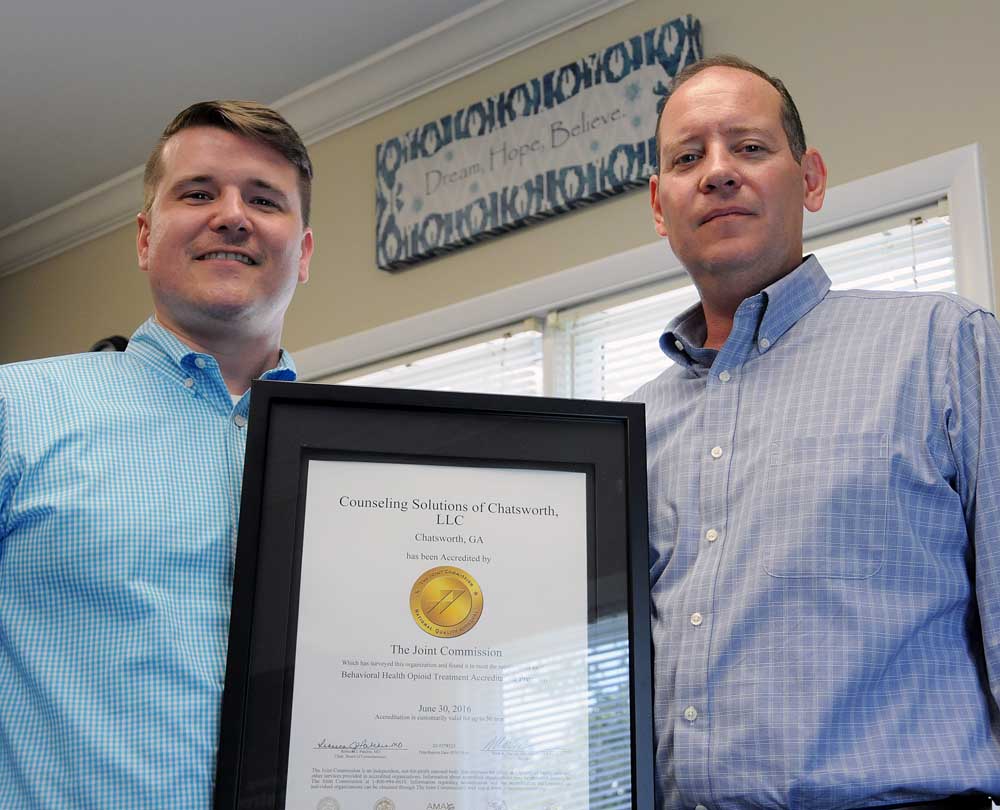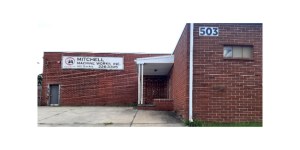Chatsworth no longer a ‘no treatment zone’ for painkillers
Published 9:52 pm Sunday, July 31, 2016

- Zac Talbott, chief operating officer at Counseling Solutions of Chatsworth, left, and Keith Jones Jr., CEO, hold their center’s state certification. Counseling Solutions is an opioid treatment center.
North Georgia, eastern Tennessee and western North Carolina have some of the highest addiction rates for opioids (narcotic painkillers) in the nation, says Zac Talbott, chief operating officer at Counseling Solutions of Chatsworth.
What the region doesn’t have is a large number of treatment centers focused on opioid addiction.
Trending
“If you look at where the existing services are, Chatsworth was in the middle of a no-treatment zone,” Talbott said. “That’s why we opened here because of the need.”
Counseling Solutions opened in February and already has almost 200 patients. It recently received accreditation from the Joint Commission.
“The same folks that certify Hamilton Medical Center and Murray Medical Center. There are 67 opioid treatment centers in Georgia, and we are one of only four to achieve Joint Commission accreditation. I think that is a testament to the philosophy and to the staff that we have,” said Keith Jones Jr., CEO of Counseling Solutions.
“There are so many hurdles to opening an opioid treatment center — the state, the federal government, so you are well vetted before you see the first patient. But you can’t get accredited until after you have actually opened because it involved someone coming to the site and observing the actual quality of the treatment you provide,” he said.
Counseling Solutions is a comprehensive treatment facility, which means it offers counseling and lifestyle and behavioral therapy but also medication.
“There’s a big push from the White House Office of (National) Drug Control Policy to expand access to medication-assisted treatment (MAT),” said Talbott. “The federal Centers for Disease Control and Prevention has been talking about it. You still have to have behavior and lifestyle change, but medications can help stabilize the body, and when you have that comprehensive treatment the success rate goes through the roof.”
Trending
The center’s physician can prescribe any of the Food and Drug Administration-approved medications to treat opioid addiction.
“There’s a variety of different brand names, but they all boil down to three medications. One is methadone, the best known. One is buprenorphine. And the other is naltrexone. Naltrexone has been around for a while, but there’s a new formulation called Vivitrol,” Talbott said. “Naltrexone has no opioids in it, so it’s the preferred treatment for drug courts. It blocks the effects of opioids. But it’s a pill, and all they have to do is not take their pill, and they can get high. But now Vivitrol is injected into the arm and lasts for 30 days. It’s so new that it’s the only one we don’t have yet, but we are working to have it soon.”
Before the center takes on any client the physician does a comprehensive physical.
“We are focused on opioid addition, but our counselors are licensed or certified to provide counseling for any substance abuse disorders, so a lot of times our primary diagnosis will be opioid addiction,” said Talbott. “But we might also see cocaine abuse or meth use, especially in this area. Once we get their opioid abuse stabilized, it makes it easier for them to address those other issues. If it’s beyond what we can handle, we reach out to some of the more traditional addiction treatment centers.”
Jones said Counseling Solutions is working to build partnerships with the local medical community, law enforcement and other treatment centers.
“Study after study shows that when comprehensive opioid treatment comes in, overdose rates go down, HIV rates and Hepatitis C infections go down, drug-related crime goes down,” Talbott said. “One study shows that for every dollar a community spends on MAT, they get four to seven dollars in return. And in this case, the community isn’t even putting the money in. Our patients are paying for their treatment.”
Center officials acknowledge that funding may be an issue for many patients. Many private health insurance plans do not cover opioid addiction treatment. The center is working on taking Medicaid.
“There’s only two other clinics in the state accepting Medicaid. A lot of clinics don’t because it’s not the easiest thing to do, but we opened here to make a difference,” Talbott said.
To reach Counseling Solutions, call (706) 971-3366.






